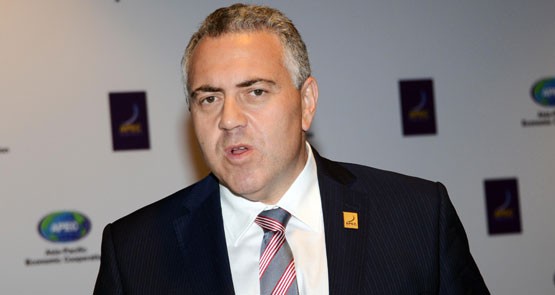
When should the Mid-Year Economic and Fiscal Outlook be released? According to the relevant legislation:
“The Treasurer is to publicly release and table a mid-year economic and fiscal outlook report by the end of January in each year, or within 6 months after the last budget, whichever is later.”
Finance Minister Mathias Cormann hung his hat on the act this morning when he dismissed my suggestions the government was hiding information as “ridiculous” (Cormann, to his credit, continues to engage with people on Twitter, unlike some of his newly promoted ministerial colleagues, who’ve gone quiet since their elevation). The government is, as Cormann suggests and as Phil Coorey has been reporting in The Australian Financial Review, considering not releasing the details of how revenue and growth forecasts have changed since the Pre-election Economic and Fiscal Outlook in August because they will show deterioration in our fiscal fiscal and economic position, alarming consumers and businesses.
Of course, the law may say by end-January, but when have governments traditionally produced it?
“We release our update on the budget before Christmas every year,” then-treasurer Peter Costello said in 2003. So, that’s one for a pre-Christmas release (and we’ll come back to Costello).
But that was a long time ago. For a more detailed guide to when MYEFO should be released, we turn to Treasurer Joe Hockey, who last year explained: “MYEFO has been released in November on seven occasions, five times in December and only twice previously in October.”
So that’s two for a pre-Christmas release, including from the new Treasurer himself.
Then there’s Hockey’s own criticism of Labor in 2011 for delaying MYEFO. “The government must immediately release its latest economic and budgetary forecasts,” Hockey thundered on November 4, 2011. That’s three for a pre-Christmas release. Why did Hockey want MYEFO released in November 2011? “Today the treasurer confirmed that the economic troubles in Europe will lead to lower economic growth, and lower budget revenues for Australia,” Hockey explained. “Given the deterioration to the economic and budgetary outlook for Australia, the treasurer must immediately release the Mid-Year Economic and Fiscal Outlook.”
So, in 2011, a deteriorating economic and fiscal outlook meant that there must be no delay in releasing MYEFO. Now, however, a deteriorating fiscal and economic outlook apparently means there should be a delay.
But there was a change last year. In 2012, the then-opposition criticised Labor for releasing MYEFO too early, in October, and using that to hide the deterioration in mining tax revenue forecasts. The opposition’s argument was subsequently proven to be correct.
The Coalition had released MYEFO in October 2007 itself, as Joe Hockey noted, but that was because of the looming election.
Moreover, since we had PEFO in August, there is actually an arguable case for waiting a bit longer to release MYEFO. So let’s make that 3-1 in favour of pre-Christmas release.
Let’s go back to Costello. Apart from 2007, Peter Costello developed the habit of slipping MYEFO out as late as possible. As Stephen Koukoulas pointed out, on two occasions Costello released MYEFO in the days immediately before Christmas. Labor used to accuse him of hiding information.
Perhaps delaying MYEFO is in the Coalition’s DNA, as complaining about MYEFO delays is in the DNA of oppositions.
The problem from analysts’ and investors’ points of view is that it appears Cormann has confirmed there will be a writedown in revenues and that’s why the Coalition is considering a delay, rather than engage in the behaviour it criticised Wayne Swan for of rushing MYEFO out before the bad news really hit. But we don’t know the scale of the writedown. It’s uncertainty — the sort of thing the Coalition promised it would end with “no surprises government”.
And in any event, it’s hard to go past Joe Hockey’s 2011 logic: “Given the deterioration to the economic and budgetary outlook for Australia, the treasurer must immediately release the Mid-Year Economic and Fiscal Outlook.”
So let’s give the Treasurer and the Minister for Finance until November 4. After that, they can properly be accused of rank hypocrisy.








Rank hypocrisy seems to be in the DNA of all politicians. They will release it when they judge it is in their own best political interest to do so. No sooner or later.
However the later they leave it, the longer they will have been in government and, therefore, the more the LNP will own the result rather than getting to crow about the budget black hole ™ bequeathed them by the previous government.